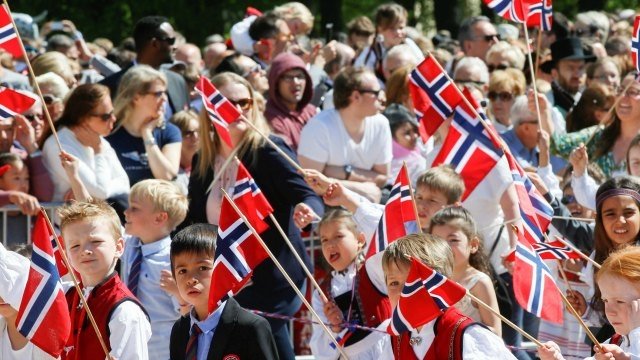
India Is Not Happy, Ranks Below Pakistan, Nepal & Bangladesh In World Happiness Report
21 March 2017 5:37 AM GMT
A landmark survey to report the state of global happiness, called the World Happiness Report, was released on 20 March 2017, at United Nations during the celebrations of International Day of Happiness. The World Happiness Report 2017 ranks 155 countries by their happiness levels, is the fifth one released since 2012. The report continues to be recognised globally as more governments, organisations and civil societies use happiness indicators to structure their policies and decisions.
Research and measurements of happiness have become mainstream, especially after Bhutan argued that this was more meaningful than measuring happiness or prosperity through mere economic metrics like GDP and Inflation. Experts now agree that Happiness Index has to include other significant measures such as social support, the spirit of generosity, and freedom of choice among many others.
Norway: Happiest Nation
Norway has secured the top spot according to the report, up from its 4th position last year. This Scandinavian country topped the list, on the basis of various key calculations that included: levels of caring, freedom to make life decisions, generosity, good governance, honesty, health and income. Denmark and Iceland secured the second and third spot respectively.
Source: DNA India
Norway’s top position, despite of the declining oil prices and depressing Nordic weather, highlights insights about the index’s calculations and emphasis. ”Norway achieves and maintains its high happiness, not because of its oil wealth, but in spite of it,” the report claims, further emphasising that, ”By choosing to produce its oil slowly, and investing the proceeds for the future rather than spending them in the present, Norway has insulated itself from the boom and bust cycle of many other resource-rich economies.”
Other factors that have been used to evaluate the ranks of 155 countries included: inequality, life expectancy, GDP per capita, public trust (low corruption in governments and businesses), and social support.
The US Ranks 14th: Drop from last year
The United States of America ranked 3rd, amongst the OECD (Organisation for Economic Cooperation & Development) nations, and 11th overall, when the index was first conceived in 2012. Its ranking has now slipped to 14th position with reasons attributed to declining social support, lower personal freedom and corruption.
Source: guim
India: Happiness levels down to 122nd
India was ranked 122nd on the 2017 World Happiness Index – a drop from the 118th position of 2016. Reportedly, India ranked quite low in six factors: income, health life expectancy, having someone to count on in times of trouble, generosity, freedom and trust. This is despite the fact that India’s GDP per capita income (also one of the metrics used for evaluation in the report) has been improving.
Source: NDTV
In fact, India ranked lower than most of the eight South Asian Association of Regional Cooperation (SAARC) nations, except the war-torn Afghanistan that was positioned at 141. Pakistan was ranked 80, Nepal stood at 99, Bhutan at 97, Bangladesh at 110 and Sri Lanka at 120. Maldives was not part of the rankings in the World Happiness Report.
Unhappiest Nations
The survey reports that most of the unhappiest countries are in the Middle East and Africa. People of Central African Republic are ranked to be the unhappiest with in the list, preceded by Burundi at 154, and Tanzania at 153. The authors of the report particularly identify the disparity between the African continent’s ageing leaders and young populations as the reason for the low scores in the region. The average age of an African leader is about 70, while around 70% of the African citizens are below 30 years old.
Key Considerations
A summary of the top 10 and lowest 10 ranked nations:
Source: hindustantimes
This year, the report emphasises social foundations of happiness including happiness at workplace. Professor Jan-Emmanuel De Neve from the University of Oxford explains that most people usually spend a majority of their lifetime at workplace, hence, understanding the role of employment and unemployment in shaping happiness becomes more important. His research further shows that there are significant differences in happiness across employment status, job type and industry sectors. He added, “People in well-paid roles are happier, but money is only one predictive measure of happiness. Work-life balance, job variety and the level of autonomy are other significant drivers”.
The rankings clearly show that four out of five happiest countries globally are in the Nordic region, while four out of five unhappiest countries are in the African region. The top ten countries are the wealthier developed nations, yet the report states that money is not the only ingredient in the recipe of happiness.
In fact, the World Happiness Report, claims that differences in happiness levels amongst the wealthier countries are mainly attributed to “differences in mental health, physical health and personal relationships: the biggest single source of misery is mental illness”. It further added that “income differences matter more in poorer countries, but even their mental illness is a major source of misery”.
Source: guardianlv
Meik Wiking, Chief Executive Officer of Happiness Research Institute in Copenhagen, Denmark attributes the success of Nordic countries to the “sense of community and understanding in the common good”.
The report states that high levels of mutual trust, shared purpose, generosity and good governance are major factors that successfully help Norway and other top countries maintain their happiness rankings.
India has a long distance to walk in the course of securing a commendable rank in the World Happiness Report. The country is grappled with severe woes like inequality, poverty, discrimination, and a corruption to a large extent. It is both the reponsibility of the citizens and the government to battle these odds out and bring about a significant change in our country.
Read the full report here.
 All section
All section


















